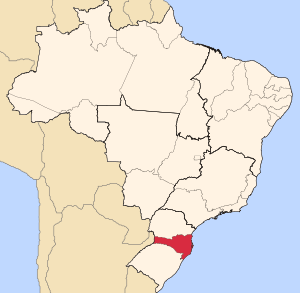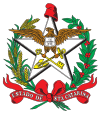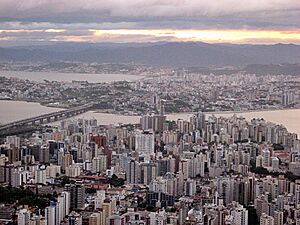Santa Catarina (state) facts for kids
Santa Catarina is a state located in Southern Brazil. It is known for having a high quality of life for its people. The capital city is Florianópolis, which is partly located on Santa Catarina Island.
Santa Catarina shares borders with the states of Rio Grande do Sul to the south and Paraná to the north. To the east, it borders the Atlantic Ocean, and to the west, it borders the Misiones province in Argentina.
Many people in Santa Catarina are descendants of immigrants from Portugal, Germany, and Italy. This gives the state a strong European feel. The largest city in Santa Catarina is Joinville.
Quick facts for kids
State of Santa Catarina
|
|||
|---|---|---|---|
|
|||

Location of State of Santa Catarina in Brazil
|
|||
| Country | |||
| Capital | Florianópolis | ||
| Former seat | Joinville | ||
| Area | |||
| • Total | 95,346.181 km2 (36,813.366 sq mi) | ||
| Area rank | 20th | ||
| Population
(2010 census)
|
|||
| • Total | 6,249,682 | ||
| • Rank | 11th | ||
| • Density | 65.547271/km2 (169.766654/sq mi) | ||
| • Density rank | 9th | ||
| Demonym(s) | Catarinense or Barriga-Verde (Green Belly) | ||
| GDP | |||
| • Year | 2006 estimate | ||
| • Total | R$ 93,173,000,000 (7th) | ||
| • Per capita | R$ 20,369 (4th) | ||
| HDI | |||
| • Year | 2005 | ||
| • Category | 0.840 – high (2nd) | ||
| Time zone | UTC-3 (BRT) | ||
| • Summer (DST) | UTC-2 (BRST) | ||
| Postal Code |
87000-000 to 89990-000
|
||
| ISO 3166 code | BR-SC | ||
| Website | sc.gov.br | ||
Contents
History of Santa Catarina
European settlements in Santa Catarina began when Spain settled Santa Catarina Island in 1542. Portugal took control of the area in 1675. The region became a "captaincy" (a type of administrative area) of Santa Catarina in 1738.
Many European immigrants, especially from Germany, started arriving in the early 1800s. Later, people from Italy, Poland, Russia, Ukraine, and Japan also came. These immigrants often started small, family-owned farms across the state.
In March 2004, Santa Catarina was hit by a hurricane. This was the first hurricane ever recorded in the South Atlantic Ocean. Brazilian weather experts named it Catarina, after the state.
People and Cultures
Most people in Santa Catarina are of European descent. About 92% of the population is white. Many have German (35%), Italian (30%), or Portuguese (22%) backgrounds. A smaller group (5%) has other European roots, like Polish, Russian, or Norwegian. The remaining 8% of the population belongs to other ethnic groups.
Portuguese Settlers
Portuguese people started arriving in Santa Catarina around the 1750s. They mainly came from the Azores islands. These settlers colonized the coast and founded many important towns, including Florianópolis, the capital. By the late 1700s, about half of Santa Catarina's population was born in Portugal.
German Settlers
Germans began arriving in 1828. They were mostly peasant farmers who came to Brazil to own their own land. This was because Germany had many people but not enough land for everyone to farm.
German immigration was slow at first, but it increased a lot in the 1850s. To encourage more German settlement in Southern Brazil, the Brazilian government created many "German colonies." Many of these colonies grew into big cities, such as Blumenau and Joinville, which is the largest city in Santa Catarina.
For many years, Germans in these communities mostly kept to themselves. They spoke German and kept their German traditions. This changed in the 1930s when Brazil declared war against Germany in 1942. German immigrants then learned Portuguese and adopted a more "Brazilian way of life."
Today, the German influence is still very strong in Santa Catarina. Many towns still show a lot of German culture. For example, Pomerode is a small town where most people are German-Brazilian and many speak German fluently. Another example is the Oktoberfest of Blumenau, a large festival celebrating German traditions. The buildings and food in many areas also show German influence.
Italian Settlers
Italian settlers started arriving in Santa Catarina in 1875. Large numbers of them came until the 1910s. They were farmers from Northern Italy. They created Italian colonies, mostly near the coast.
At first, some Italian settlements struggled. Many Italians got sick from tropical diseases or left to find better conditions. However, in southern Santa Catarina, they found cooler weather and better land, and their colonies did very well. Many Italians in this region also worked in the coal industry.
Main Cities
- Balneário Camboriú
- Blumenau
- Brusque
- Chapecó
- Criciúma
- Florianópolis
- Itajaí
- Itapema
- Jaraguá do Sul
- Joaçaba
- Joinville
- Lages
- São José
| States of Brazil | |
|---|---|
| Acre | Alagoas | Amapá | Amazonas | Bahia | Ceará | Espírito Santo | Goiás | Maranhão | Mato Grosso | Mato Grosso do Sul | Minas Gerais | Pará | Paraíba | Paraná | Pernambuco | Piauí | Rio de Janeiro | Rio Grande do Norte | Rio Grande do Sul | Rondônia | Roraima | Santa Catarina | São Paulo | Sergipe | Tocantins | |
| Federal District: Brazilian Federal District | |
Images for kids
-
Aerial view of Florianópolis
-
Joinville, the largest city of Santa Catarina, settled by Germans in 1851.
-
Chapecó is the main city in the West of Santa Catarina
-
Sunset in Criciúma.
-
Hering headquarters, in Blumenau
-
Federal University of Santa Catarina in Florianópolis.
See also
 In Spanish: Santa Catarina para niños
In Spanish: Santa Catarina para niños
 | Delilah Pierce |
 | Gordon Parks |
 | Augusta Savage |
 | Charles Ethan Porter |































